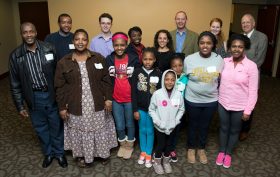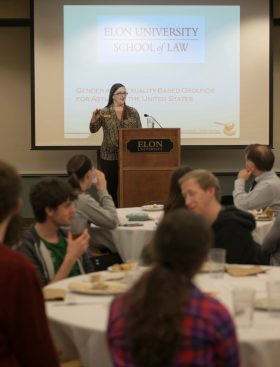Elon University students and faculty raised money this year to purchase a desktop system to help an African family adjust to life in the United States.

[/caption]Residents of Elon University’s Global Neighborhood presented a desktop computer system Tuesday evening to an African family new to the country after spending several years in a refugee camp.
The gift to Emmanuel Kwitonda, his wife and their seven daughters was made during a Global Neighborhood House Dinner on March 3, 2015, in the Lakeside Meeting Rooms.
Neighborhood residents had fundraised for the computer since the fall when they “adopted” the family through the North Carolina African Services Coalition office in Greensboro, a nonprofit that provides services and helps asylees resettle in region.
Since then, students have volunteered their time to help the Kwitondas learn English and acclimate to life in the West through games, activities, typing lessons and more. “It was a mutually rewarding friendship and cultural exchange,” said Assistant Professor Mussa Idris, a faculty member who lives in the Global Neighborhood and helped coordinate volunteer efforts. “We’ve learned so much from the family.”
Latosha Walker, operations manager for the North Carolina African Services Coalition, presented the Global Neighborhood with a plaque in appreciation of its efforts to build relationships with immigrant communities.
“You have become their family, and I love the fact that you express how you’ve learned from them as much as they’ve learned from you,” Walker said. “You all can feel free to be friends with our families at any time.”
The Kwitondas are originally from the Democratic Republic of the Congo but fled to Rwanda in the late 1990s amidst ethnic persecution in their home nation. They lived in a refugee camp there for 17 years.

[/caption]The gift presentation took place during a dinner discussion about gender and sexuality-based grounds for asylum in the United States. Led by Assistant Professor Heather Scavone, director of the Humanitarian Immigration Law Clinic in the Elon University School of Law, dozens of Global Neighborhood residents joined with faculty members, law school students and Elon President Leo M. Lambert to debate legal issues that confront asylum seekers.
Lambert concluded the dinner by sharing findings from a survey of 30,000 college graduates by Gallup and Purdue University.
If graduates of a college had in their lives professors who cared about them as people, made them excited about learning, and encouraged them to pursue their personal dreams, their odds at being very engaged in their work following graduation more than doubled, Lambert said. The odds of being happy people following graduation more than doubled as well.
By fostering community in the Global Neighborhood through service, he added, residents are setting themselves up for a fulfilling life.
“When you think about it, what you’re doing here in this room tonight and what you’re doing in the Global Neighborhood is what you’re going to remember being best about your university education 10 years, 20 years, 30 years from now,” he said. “If all of us take time to build these kinds of meaningful relationships, we are creating a stronger community, but in another important sense, we’re also contributing to your long term success and happiness.”


